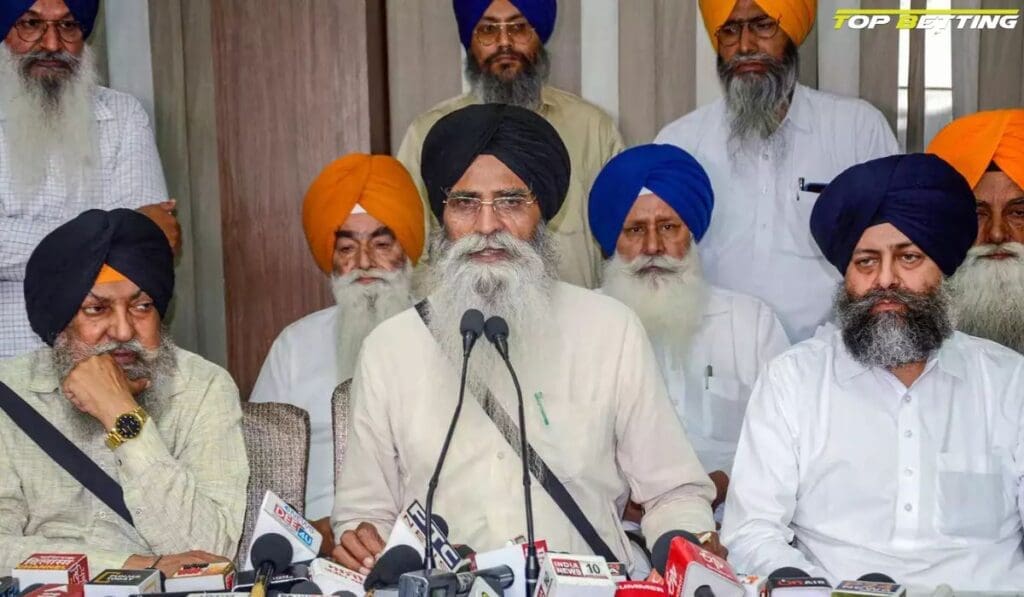
Why BJP has been charged in Sikh affairs | In Punjab
Following the induction of over a thousand Sikh leaders in Delhi, the SGPC and the BJP’s erstwhile ally Akali Dal have both taken aim at it, with Badal, the chief of Akali, claiming that the party is attempting to “weaken all Sikh institutions”.
The BJP is poised to clash with its erstwhile ally Shiromani Akali Dal (SAD) and the Sikh religious establishment, which the Akalis control, as it seeks to extend its influence in Punjab and shed its reputation as an urban Hindu party.
The most recent indication was that over a thousand Sikh leaders, including six elected members and one former member of the Delhi Sikh Gurdwara Management Committee (DSGMC), joined the BJP on Saturday in Delhi. The national Sikh top body that is in charge of gurdwara management, the Shiromani Gurdwara Parbandhak Committee (SGPC), responded to this right away.
The SGPC asked that the new inductees leave the DSGMC and accused the BJP of meddling in religious matters. The Badal family, which controls the SAD, is believed to have had significant influence over the organization and its top positions throughout the years. The BJP is headed toward “direct interference in Sikh affairs, which the Sikh community will never accept,” according to SGPC chief Harjinder Singh Dhami on Saturday.
“The sangat (community) elects the members of the Sikh organization with the expectation that they would uphold religious beliefs and customs. However, it is understandable that the sangat’s feelings would be hurt when members join a party with anti-Sikh views, according to Dhami.
The BJP’s decision to induct so many Sikh leaders is in line with its immediate objective of hurting the INDIA bloc in Sikh-majority Delhi Lok Sabha constituencies, including West Delhi, North East Delhi, and Chandni Chowk. Additionally, it sends a message to the Punjabi Sikh community, to whom the party has been reaching out following the blow it suffered during the recent farm demonstrations. However, the Akalis traditionally received the rural votes throughout their more than two-decade collaboration, and regaining those votes is crucial if the BJP is to survive, thus the BJP’s growth in Punjab is not welcome news to its erstwhile friend.
Sukhbir Singh Badal, the president of SAD, criticized the DSGMC members’ induction on Tuesday. The DSGMC, HSGPC (in Haryana), and the management boards of our Takht Sahibans are just a few examples of the Sikh institutions that this party has been working hard to undermine. The community is fully aware of every strategy employed by this national party. In the Lok Sabha elections, I have no doubt that Punjabis in general and Sikhs in particular would decisively reject the saffron party, Badal declared.
Badal criticized the reconstitution of the Shri Hazur Sahib Management Board in February, a move carried out by the Maharashtra government, of which the BJP is a member. He reminded the Prime Minister in a letter that one of the main promises of the Union government following Independence was that it would not meddle in Sikh religious matters without first receiving consent from a two-thirds majority of the SGPC.

According to former DSGMC president Paramjit Singh Sarna, the BJP would not gain from admitting so many Sikhs to the organisation. “They are incorrect if they think they will win over Sikh voters by doing this. He stated, “If voters outside of Punjab are upset with them, then so are voters inside Punjab.
Harjeet Singh Grewal, a member of the BJP National Executive Committee, questioned Dhami’s relationship with the Akali Dal and criticized his statement. Grewal stated, “Dhami himself should first respond as to what interests he has with the SAD.”
According to the BJP leader, Dhami was not in a position to call for the resignation of the DSGMC members. He stated, “The Khalsa Panth does not limit what party Sikhs can join. If Dhami did not speak out against Sikhs joining the Congress, a party linked to the Sikh massacre, then why is he giving threatening advice to those who join the BJP?”
Iqbal Singh Lalpura, the chairperson of the National Commission for Minorities, has spoken at multiple meetings with victims of the 1984 anti-Sikh riots as part of the Central government’s outreach to the Sikh community in recent months. Some estimates have their number of voters in Ludhiana, Mohali, Amritsar, and Patiala at above two lakh. A number of Sikhs, including former Khadi Board chief Harjeet Singh Grewal and MLAs Fateh Jung Bajwa and Kewal Singh Dhillon, have been named by the BJP to the Punjab executive committee.

Nonetheless, the party still encounters strong opposition from farmer unions in rural areas. BJP officials have occasionally had to alter their plans in order to get to campaign locations. The BJP is now concentrating more of its grassroots campaigning efforts to address this issue, and it has also begun forming committees at the village level. In villages, party employees stationed at booth level have been directed to conduct one-on-one “chai pe charcha (conversations over cups of tea)” meetings.












